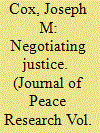| Srl | Item |
| 1 |
ID:
131512


|
|
|
|
|
| Publication |
2014.
|
| Summary/Abstract |
This research note highlights an important element missing from rational design theories of international agreements: "institutional context"-the presence or absence of existing and prior agreements between prospective partners in "new" cooperation. If, as rational design theorists argue, agreement design is deliberate, strategic, and directed toward enhancing contracting parties' ability to credibly commit to future cooperation, then prior design "successes" should influence the terms of additional cooperation. We test for this omitted variable problem in three agreement design outcomes: ex ante limitations on agreement duration, exit clauses, and dispute-settlement provisions. Through an augmentation and reanalysis of data from a key study in the rational design literature-Barbara Koremenos's "Contracting Around International Uncertainty"-we show institutional context is positively correlated with inclusion of ex ante time limitations in negotiated agreements and negatively correlated with the inclusion of exit clauses and third-party dispute-settlement provisions. Institutional context also mediates and conditions the effects of the explanatory variable at the heart of existing rational design theories-uncertainty about the future distribution of gains from cooperation. Our findings show that the collective appeal of particular design features varies not only with the nature of underlying strategic problems, but also with degrees of shared institutional context.
|
|
|
|
|
|
|
|
|
|
|
|
|
|
|
|
| 2 |
ID:
173900


|
|
|
|
|
| Summary/Abstract |
Post-conflict justice is an integral component in maintaining stability and building peace in the aftermath of civil conflict. Despite its instrumental function, scholars routinely find that policymakers’ choice of justice is shaped by the structural conditions of the post-conflict environment, with outright victories leading to retributive forms of justice and negotiated outcomes yielding restorative forms of justice. However, existing literature conflates ceasefires and peace agreements into a single phenomenon, thereby overlooking the independent effects of each outcome. Leveraging the dual sovereignty framework, this article argues the conflation of negotiated outcomes is problematic because peace agreements and ceasefires generate different post-conflict environments. Relative to ceasefires, peace agreements lead to a reduction in the degree of dual sovereignty because they resolve a conflict’s incompatibility, thereby encouraging efforts to move society beyond war through restorative forms of justice. Due to the persistent threat of recurrent war generated by high levels of dual sovereignty, policymakers following ceasefires will be inclined to pursue retributive forms of justice that may target political opponents or potential defectors to bolster organizational strength. Statistical analyses confirm the underlying expectation that ceasefires and peace agreements yield different post-conflict justice outcomes. Peace agreements, relative to ceasefires, are more likely to be followed by the implementation of amnesties and reparations, whereas ceasefires exhibit a greater probability of yielding purges in the post-conflict environment.
|
|
|
|
|
|
|
|
|
|
|
|
|
|
|
|
| 3 |
ID:
172308


|
|
|
|
|
| Summary/Abstract |
An international negotiated agreement is typically viewed as a major achievement, but it may not last forever. Sometimes agreements need to be adjusted – still based on the existing formulas – as a result of changed circumstances or because particular provisions prove not as effective as originally hoped. But other times, agreements need to be overhauled from scratch and renegotiated using new formulas and possibly involving new actors. Such renegotiations are an under-examined process in the negotiation literature. When and why are renegotiations called for, and what are the best tactics and strategies to ensure that they succeed for the mutual benefit of all stakeholders? This article presents basic research questions that need to be addressed.
|
|
|
|
|
|
|
|
|
|
|
|
|
|
|
|
| 4 |
ID:
152789


|
|
|
|
|
| Summary/Abstract |
Large-scale mineral extraction is often accompanied by local conflicts, reflecting the fact that affected communities feel the costs of development but enjoy few of its benefits. Much of this conflict could be mitigated if communities could influence the design of projects and of management systems intended to minimise their impacts. This paper examines the potential role of community-controlled impact assessment, combined with negotiation of binding agreements between communities and developers, to allow affected communities to shape the impacts of extractive projects. It considers the wider political factors that must be addressed if these mechanisms are to be effective.
|
|
|
|
|
|
|
|
|
|
|
|
|
|
|
|